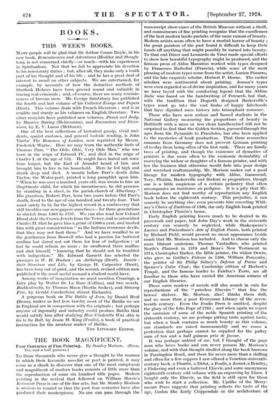BOOKS.
THIS WEEK'S BOOKS.
MAD' people will be glad that Sir Arthur Conan Doyle, in his new book, Reminiscences and Adventures (Hodder and Stough- ton), is not concerned chiefly—or much—with his experiences in Spiritualism. Not that we fail to appreciate his devotion to his missionary duties ; but, after all, they make only a tenth part of his thought and of his life ; and he has a great deal of interest to recall on other subjects. We are entertained, for example, by accounts of how the deductive methods of Sherlock Holmes have been proved sound and valuable in tracing real criminals ; and, of course, there are many reminis- cences of famous men. Mr. George Saintsbury has publghed the fourth and last volume of his Collected Essays and Papers (Dent). This volume deals with French literature ; and is as erudite and sturdy as his volumes on English literature. Two other essayists have published new volumes, Punch and Judy, by Maurice Baring (Heinemann), and Encounters and Diver- sions, by E. V. Lucas (Methuen).
One of the best collections of historical gossip, vivid inci- dents, quaint customs, and general bedside reading, is John Timbs' The Romance of London, now reprinted by Messrs. Frederick Warne. here we may learn the authentic facts of Thomas Parr, " The Olde, Olde, Very Olde Man," who was born in the reign of Edward IV., and died in the reign of Charles I. at the age of 152. He might have lasted out some time longer, but the Earl of Arundel heard of him and brought him to live in his household. Here he fed high and drank deep and died. A month before Parr's death John Taylor, the Water-poet, printed a long pamphlet upon him. " When he was over a hundred years old, was sworn to him an illegitimate child, for which his incontinence, he did penance by standing in a sheet, in the parish church of Alberbury." His grandson, Robert Parr, born two years before Old Parr's death, lived to the age of one hundred and twenty-four. That must surely be by far the highest record in a controversy that still troubles our newspapers sometimes—for three generations to stretch from 1483 to 1757. We can also read how Colonel Blood stole the Crown Jewels from the Tower, and so astonished Charles II. that he gave him a grant of £500 a year, and treated him with great consideration " as the Indians reverence devils, that they may not hurt them." And we have recalled to us the gentleman from Boswell who had a passion for buttered muffins but dared not eat them for fear of indigestion ; at last he could refrain no more ; he swallowed three muffins and shot himself, " knowing that he should not be troubled with indigestion." Mr. Edward Garnett has selected the passages in W. H. Hudson : an Anthology (Dent). Insects : their Structure and Life, by George H. Carpenter (Dent), has been long out of print, and the second, revised edition now published is the most useful manual a student could have.
Among works of imagination we must mention Crossings, a fairy play by Walter De La Mare (Collins), and two novels, Buddenbrooks, by Thomas Mann (Martin Seeker), and Striving Fire, by Gerald Cumberland (Grant Richards).
A gorgeous book on The Batiks of Java, by Daniel Real (Benn),- makes us feel how tawdry most of the Batiks we see in England are in comparison with the originals ; but perhaps anyone of ingenuity and industry could produce Batiks that would Satisfy him after studying How Cinderella Wai Able to Go to the Ball, by Jessie M. King (Foulis), a book of practical instruction for the amateur maker of Batiks.
TILE LITERARY EDITOR.






































 Previous page
Previous page